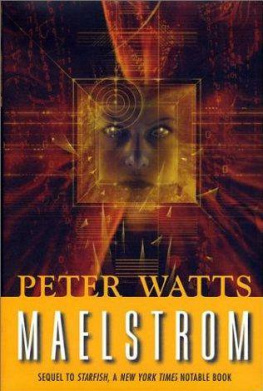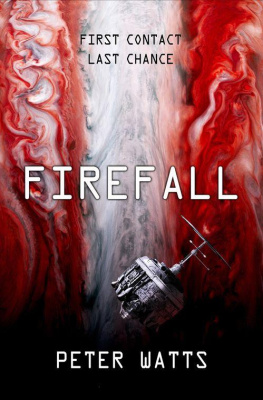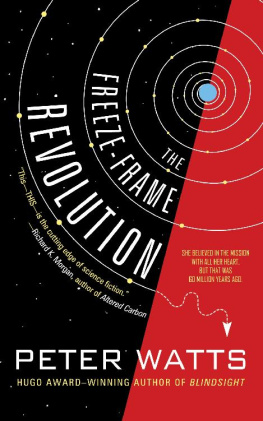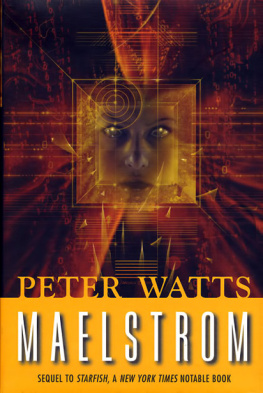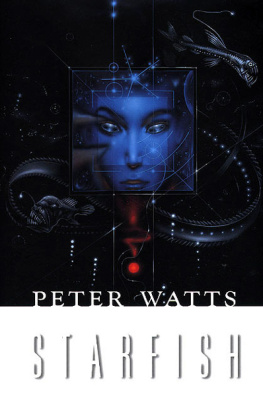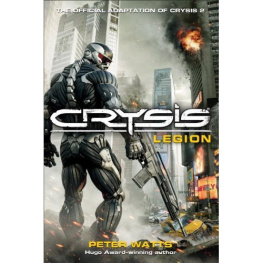Peter Watts - Malak
Here you can read online Peter Watts - Malak full text of the book (entire story) in english for free. Download pdf and epub, get meaning, cover and reviews about this ebook. year: 2010, genre: Science fiction. Description of the work, (preface) as well as reviews are available. Best literature library LitArk.com created for fans of good reading and offers a wide selection of genres:
Romance novel
Science fiction
Adventure
Detective
Science
History
Home and family
Prose
Art
Politics
Computer
Non-fiction
Religion
Business
Children
Humor
Choose a favorite category and find really read worthwhile books. Enjoy immersion in the world of imagination, feel the emotions of the characters or learn something new for yourself, make an fascinating discovery.

- Book:Malak
- Author:
- Genre:
- Year:2010
- Rating:4 / 5
- Favourites:Add to favourites
- Your mark:
- 80
- 1
- 2
- 3
- 4
- 5
Malak: summary, description and annotation
We offer to read an annotation, description, summary or preface (depends on what the author of the book "Malak" wrote himself). If you haven't found the necessary information about the book — write in the comments, we will try to find it.
Malak — read online for free the complete book (whole text) full work
Below is the text of the book, divided by pages. System saving the place of the last page read, allows you to conveniently read the book "Malak" online for free, without having to search again every time where you left off. Put a bookmark, and you can go to the page where you finished reading at any time.
Font size:
Interval:
Bookmark:
Malak,
An ethically-infallible machine ought not to be the goal. Our goal should be to design a machine that performs better than humans do on the battlefield, particularly with respect to reducing unlawful behaviour or war crimes.
Lin et al, 2008: Autonomous Military Robotics: Risk, Ethics, and Design[Collateral] damage is not unlawful so long as it is not excessive in light of the overall military advantage anticipated from the attack.
US Department of Defence, 2009IT IS SMART but not awake.
It would not recognize itself in a mirror. It speaks no language that doesnt involve electrons and logic gates; it does not know what Azrael is, or that the word is etched into its own fuselage. It understands, in some limited way, the meaning of the colours that range across Tactical when its out on patrol friendly Green, neutral Blue, hostile Red but it does not know what the perception of colour feels like.
It never stops thinking, though. Even now, locked into its roost with its armour stripped away and its control systems exposed, it cant help itself. It notes the changes being made to its instruction set, estimates that running the extra code will slow its reflexes by a mean of 430 milliseconds. It counts the biothermals gathered on all sides, listens uncomprehending to the noises they emit

hartsandmyndsmyfrendhartsandmynds
rechecks threat-potential metrics a dozen times a second, even though this location is secure and every contact is Green.
This is not obsession or paranoia. There is no dysfunction here. Its just code.
Its indifferent to the killing, too. Theres no thrill to the chase, no relief at the obliteration of threats. Sometimes it spends days floating high above a fractured desert with nothing to shoot at; it never grows impatient with the lack of targets. Other times its barely off its perch before airspace is thick with SAMs and particle beams and the screams of burning bystanders; it attaches no significance to those sounds, feels no fear at the profusion of threat icons blooming across the zonefile.

thatsitthen. weereelygonnadoothis?
Access panels swing shut; armour snaps into place; a dozen warning registers go back to sleep. A new flight plan, perceived in an instant, lights up the map; suddenly Azrael has somewhere else to be.
Docking shackles fall away. The Malak rises on twin cyclones, all but drowning out one last voice drifting in on an unsecured channel:
justwattweeneed. akillerwithaconshunce.
The afterburners kick in. Azrael flees Heaven for the sky.
Twenty thousand meters up, Azrael slides south across the zone. High-amplitude topography fades behind it; corduroy landscape, sparsely tagged, scrolls beneath. A population centre sprawls in the nearing distance: a ramshackle collection of buildings and photosynth panels and swirling dust.
Somewhere down there are things to shoot at.
Buried high in the glare of the noonday sun, Azrael surveils the target area. Biothermals move obliviously along the plasticized streets, cooler than ambient and dark as sunspots. Most of the buildings have neutral tags, but the latest update reclassifies four of them as UNKNOWN. A fifth a rectangular box six meters high is officially HOSTILE. Azrael counts fifteen biothermals within, Red by default. It locks on
and holds its fire, distracted.
Strange new calculations have just presented themselves for solution. New variables demand constancy. Suddenly there is more to the world than wind speed and altitude and target acquisition, more to consider than range and firing solutions. Neutral Blue is everywhere in the equation, now. Suddenly, Blue has value.
This is unexpected. Neutrals turn Hostile sometimes, always have. Blue turns Red if it fires upon anything tagged as FRIENDLY, for example. It turns Red if it attacks its own kind (although agonistic interactions involving fewer than six Blues are classed as DOMESTIC and generally ignored). Noncombatants may be neutral by default, but theyve always been halfway to hostile.
So its not just that Blue has acquired value; its that Blues value is NEGATIVE. Blue has become a cost.
Azrael floats like three thousand kilograms of thistledown while its models run. Targets fall in a thousand plausible scenarios, as always. Mission objectives meet with various degrees of simulated success. But now, each disappearing blue dot offsets the margin of victory a little; each protected structure, degrading in hypothetical crossfire, costs points. A hundred principle components coalesce into a cloud, into a weighted mean, into a variable unprecedented in Azraels experience: Predicted Collateral Damage.
It actually exceeds the value of the targets.
Not that it matters. Calculations complete, PCD vanishes into some hidden array far below the here-and-now. Azrael promptly forgets it. The mission is still on, red is still red, and designated targets are locked in the cross-hairs.
Azrael pulls in its wings and dives out of the sun, guns blazing.
As usual, Azrael prevails. As usual, the Hostiles are obliterated from the battlezone.
So are a number of Noncombatants, newly relevant in the scheme of things. Fresh shiny algorithms emerge in the aftermath, tally the number of neutrals before and after. Predicted rises from RAM, stands next to Observed: the difference takes on a new name and goes back to the basement.
Azrael factors, files, forgets.
But the same overture precedes each engagement over the next ten days; the same judgmental epilogue follows. Targets are assessed, costs and benefits divined, destruction wrought then reassessed in hindsight. Sometimes the targeted structures contain no red at all, sometimes the whole map is scarlet. Sometimes the enemy pulses within the translucent angular panes of a PROTECTED object, sometimes next to something Green. Sometimes there is no firing solution that eliminates one but not the other.
There are whole days and nights when Azrael floats high enough to tickle the jet stream, little more than a distant circling eye and a signal relay; nothing flies higher save the satellites themselves and occasionally one of the great solar-powered refuelling gliders that haunt the stratosphere. Azrael visits them sometimes, sips liquid hydrogen in the shadow of a hundred-meter wingspan but even there, isolated and unchallenged, the battlefield experiences continue. They are vicarious now; they arrive through encrypted channels, hail from distant coordinates and different times, but all share the same algebra of cost and benefit. Deep in Azraels OS some general learning reflex scribbles numbers on the back of a virtual napkin: Nakir, Marut and Hafaza have also been blessed with new vision, and inspired to compare notes. Their combined data pile up on the confidence interval, squeeze it closer to the mean.
Foresight and hindsight begin to converge.
PCD per engagement is now consistently within eighteen percent of the collateral actually observed. This does not improve significantly over the following three days, despite the combined accumulation of twenty-seven additional engagements. Performance vs. experience appears to have hit an asymptote.
Stray beams of setting sunlight glint off Azraels skin, but night has already fallen two thousand meters below. An unidentified vehicle navigates through that advancing darkness, on mountainous terrain a good thirty kilometres from the nearest road.
Azrael pings orbit for the latest update, but the link is down: too much local interference. It scans local airspace for a dragonfly, for a glider, for any friendly USAV in laser range and sees, instead, something leap skyward from the mountains below. It is anything but friendly: no transponder tags, no correspondence with known flight plans, none of the hallmarks of commercial traffic. It has a low-viz stealth profile that Azrael sees through instantly: BAE Taranis, 9,000 kg MTOW fully armed. It is no longer in use by friendly forces.
Font size:
Interval:
Bookmark:
Similar books «Malak»
Look at similar books to Malak. We have selected literature similar in name and meaning in the hope of providing readers with more options to find new, interesting, not yet read works.
Discussion, reviews of the book Malak and just readers' own opinions. Leave your comments, write what you think about the work, its meaning or the main characters. Specify what exactly you liked and what you didn't like, and why you think so.

